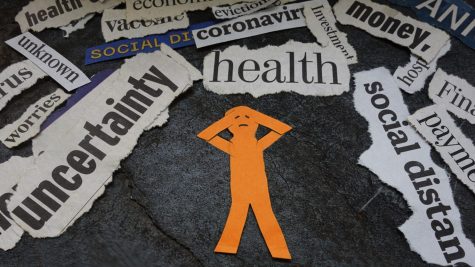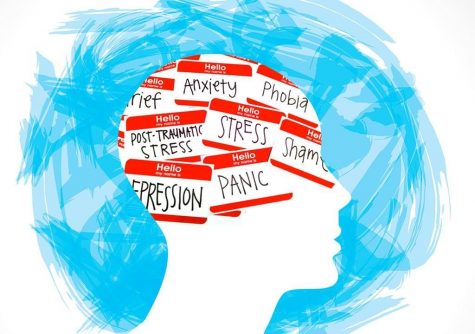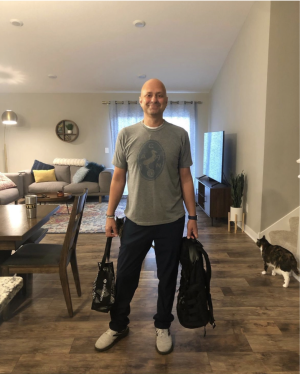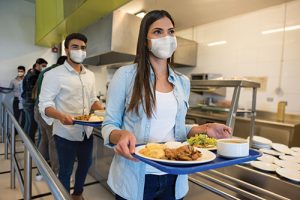The Coronavirus’ Impact on Totino-Grace Students’ Mental Health
Integrating a new normal, the coronavirus pandemic rearranges the lives of every individual throughout the world, including school systems.
November 16, 2020
The lack of consistency and numerous unknowns within the school systems during this pandemic lead to mental health concerns among students, including ones attending Totino-Grace High School.
With high schools re-opening, enforcing a hybrid model, or learning solely online, the uncertainties of this school year increase mental health concerns among teens. Before the pandemic, the youth experienced increased rates of depression, anxiety, and suicide. With these pre-pandemic rates, mental health experts are especially concerned with the psychological toll that the pandemic will have on the younger generation.
A recent survey done by Active Minds, a nonprofit organization that supports mental health education for youth, states that 80% of students have experienced a negative impact on their mental health due to the pandemic and 20% say that their mental health has dramatically worsened.
In addition to the Anoka-Hennepin school district converting to distance learning, a multitude of high schools in Minnesota are referring to online learning due to an increase in coronavirus cases. Totino-Grace, however, continues in-person learning with a multitude of precautions to ensure the safety of students. One precaution is the option for students to remotely learn.
In shifting to virtual learning, Totino-Grace school counselor, Joseph Morcomb, said, “The greatest factor to mental health is not whether a student attends school virtually or online.
However, showing up to school in-person can provide an avenue to more protective factors in a teenager’s life including caring relationships and a sense of purpose through activities, sports, or volunteering.”
Though the majority of Totino-Grace students are attending school in-person, students’ mental health, compared to Anoka-Hennepin students’ mental health, is not superior due to the style of learning. Rather, it is due to one’s individual actions. Morcomb believes, “Student access to resources and having strong social skills/an established social network, academic habits and skills of self-advocacy are indicators of how they will navigate their mental health.”
The uncertainty and lack of a stable routine increase mental health concerns among Totino-Grace students. “Students thrive in an environment that has consistent routine and expectations,” Morcomb said. Without a sense of normalcy and stability, students have an increasingly difficult time finding ways to remain positive in an ever-changing time where the majority of current events are negative.
“Ongoing changes in schedule and expectations, a disconnect in developing authentic relationships through masks, virtual learning and distance, along with a reduced opportunity to participate in mission trips, volunteering and activities/sports” are factors that undo a stable, normal life, Morcomb said. In the absence of routine and stability, mental health has the ability to grow increasingly negative with the surrounding world.
 At the start of the new 2020-2021 school year, Totino-Grace students’ morale was high and the anticipation to return to campus was prevalent. With the precautionary measures put into place, students were ready to step foot on campus to bring back a sense of normalcy. Maddie Erickson, a junior at Totino-Grace, said, “At the beginning, I was not worried about the COVIDLa plan as much because I didn’t think many people would get it.”
At the start of the new 2020-2021 school year, Totino-Grace students’ morale was high and the anticipation to return to campus was prevalent. With the precautionary measures put into place, students were ready to step foot on campus to bring back a sense of normalcy. Maddie Erickson, a junior at Totino-Grace, said, “At the beginning, I was not worried about the COVIDLa plan as much because I didn’t think many people would get it.”
With the arrival of coronavirus cases within Totino-Grace, uncertainty and concern have been felt among the community. “Now that we have confirmed cases, I think differently than in the beginning,” Erickson said. “I noticed that at first, people lax on the rules and would wear their masks down and wouldn’t really care, now I feel like people are getting better, but we obviously have some flaws.”
Concerns and unknowns negatively impact students’ mental health. “I have seen an increase in students opting for virtual learning,” Morcomb said. “I absolutely see that students with pre-existing mental health conditions… are experiencing exacerbated symptoms of their diagnosis through days and weeks where cases are present.”
Increasing numbers of coronavirus cases mean an increase in students that have to virtual learn due to exposure. Halle Audette, a junior at Totino-Grace that quarantined due to coronavirus exposure, said, “Yes [my mental health was impacted]. After a couple of days [of quarentining], it got super lonely and I was feeling super left out.” Due to the impact of the coronavirus, at Totino-Grace, there are “three times as many referrals to mental health therapists and double the need in students needing intensive mental health services,” according to Morcomb.
Totino-Grace has numerous resources to assist students in this uncertain time. School counselors are available to assist and alleviate anxiety and depression symptoms, as well as other mental health concerns – they can also make connections towards other therapy care. In the Totino-Grace counseling office, mental health screenings, and small group opportunities on a variety of topics are available to all students.
During this time, it is important to remember that “our entire community needs to take things off of their plate, to slow down, to drop from an AP class…, to accept that a mediocre year does not make them a mediocre person,” Morcomb said. 2020 has been a difficult, unique year for everyone, but someone struggling with mental health should not hesitate to reach out to a trusted individual and get help.
Helpful resources:
- National Suicide Prevention Lifeline (24/7): 1-800-273- 8255
- Crisis Text Line: 741741
- Therapist referrals: Psychology Today, Mental Health America, Totino-Grace counseling office
- Talk or Text Therapy: Talkspace, BetterHelp, Trusst





